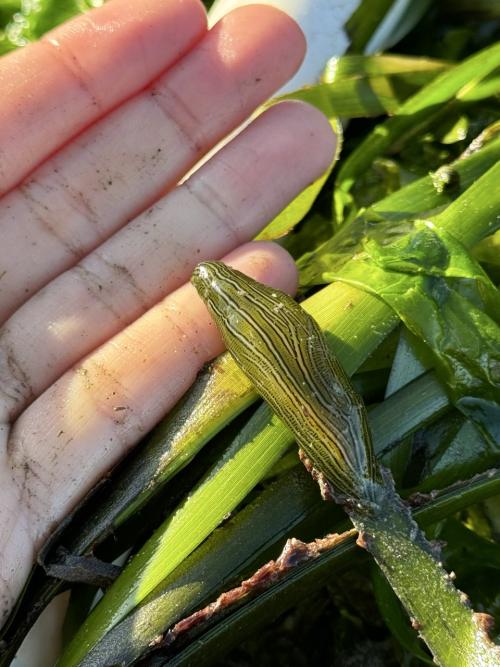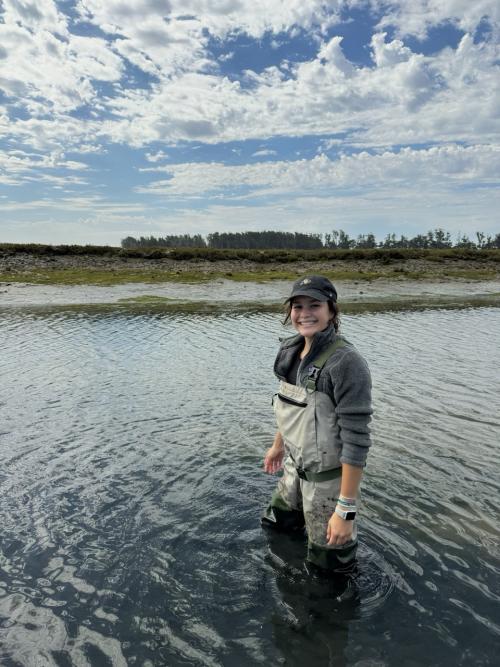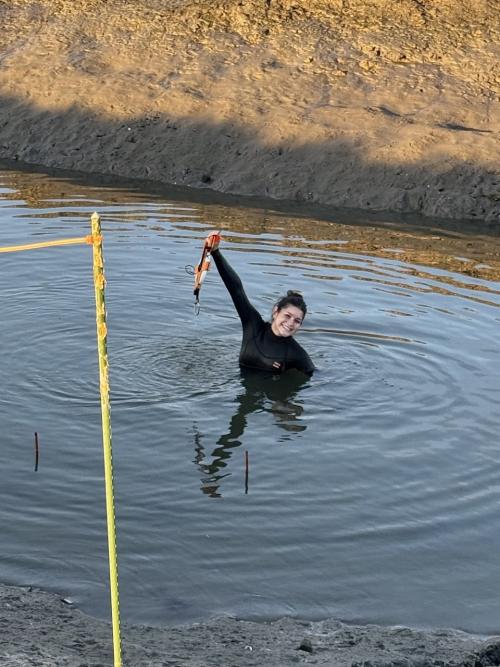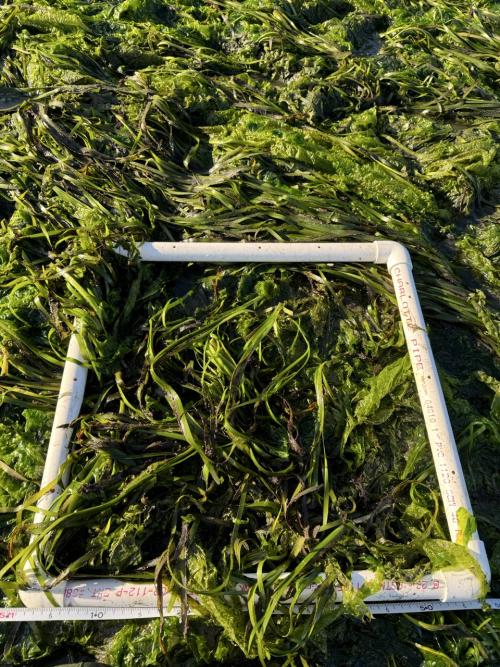
Meet Elisabeth Sellinger
Elisabeth Sellinger is a Ph.D. Candidate in the Department of Earth and Planetary Sciences. She’s exploring carbon sequestration in seagrass meadows before and after restoration.
What led you to want to study and research environmental solutions?
Elisabeth Sellinger: Growing up in California and Singapore, I've always lived near the ocean, and felt very connected to it in many different ways. After moving to Colorado and being away from the ocean, I had a newfound appreciation it. I completed my undergraduate studies in Colorado, but I was still interested in pursuing Marine Science, even though I was land locked. I ended up doing an National Science Foundation Research Experience for Undergraduates in the summer of 2022 at the University of Rhode Island's Graduate School of Oceanography. In that internship, I learned how to value things outside of academia and kind of the bigger picture of why this matters. That felt much more purposeful to me. I felt like that was a new motivation for doing science. The internship also encouraged me to apply to graduate school where I wanted to continue doing research in this way. That's how I found my current advisor at Tessa Hill, and she is at the cusp of all these different kinds of collaborative climate research in the ocean.


What are your most significant research accomplishments?
Elisabeth Sellinger: In terms of my current research, it's so funny to think about this, because in school with accomplishments you think of graduating, and publishing papers. I'm really proud of creating a relationship with two national marine sanctuaries, Monterey Bay and the Greater Farallones Island Lab, and working with them to come up with research questions that are meaningful to myself, to them and the communities they represent. I can ask questions that are relevant beyond what I'm interested in or what people In my field are interested in. In terms of publishable results, I do have a paper coming out, which is always exciting.
What are the short and long-term goals you hope to achieve with your research?
Elisabeth Sellinger: I feel like I might have answered this question differently a couple months ago, but now, with circumstances changing in terms of funding and things like this, I feel like I'm in a mindset of like, let's get through it. Let's do what we can while we can.
In the short term, I'd like to start field work in San Francisco Bay, in Richardson Bay, in partnership with Kathy Boyer at the Estuary and Ocean Science Center at San Francisco State University, and start putting out sediment measurement plates in the area. I'd like to wrap up work in the Elkhorn Slough above Monterey where I'm currently working, and, I'm excited this summer to be working with a scholar through the EVE internship program at the Bodega Marine Laboratory to start work on carbon storage in aquaculture systems. Those are my short term wish list goals. In the long term, I would love to graduate, and find a job that incorporates other forms of knowledge and community engagement, not just research in isolation. I'm not interested in going into academia at this moment, so I'm trying to find a position that incorporates all my interests, ideally in California.
How has your research influenced your thinking?
Elisabeth Sellinger: I've always considered my day-to-day activities in relation to the climate and the planet, but now I think about it every day. At times I almost want to have some sort of separation, which is hard. The question I think about or get asked sometimes is how to deal with learning about climate change and all the related things on a day-to-day basis. I took a UC-wide course, on climate anxiety a year ago. We are fueled by our love and responsibility to our home, and that's our motivator. I feel very connected with my research, but at the same time, I sometimes need a bit of separation.
Tell me about your typical day as a researcher.
Elisabeth Sellinger: Every day definitely looks different. I'm in a unique situation where I'm a full time student at UC Davis on the main campus, but the lab I work in is at the Bodega Marine Laboratory two hours away, on the coast. I'll usually split up my week where I'll do one or two days at the lab and drive there and stay the night so I can process samples. My fieldwork is quarterly with a seagrass monitoring project set up in Elkhorn Slough. I go out there about every three months to check on sediment accumulation monitoring devices that I have out there. Those are usually a couple day trips. Currently my day-to-day consists of reading a lot of papers because I have my qualifying exams coming up (update: I passed!). There's a lot of reading and writing associated with being a researcher, lots of meetings to collaborate on, and finding out how we can work together. This summer is going to be a lot more fieldwork. At the site in San Francisco and in Elkhorn Slough, I'll examine sea grasses there. Essentially looking at carbon storage in restored areas, so where we've replanted sea grass in areas that have been degraded, and kind of looking at carbon storage in relation to that effort. In Tomales Bay I’ll be looking at carbon storage and sediment dynamics in aquaculture systems in partnership with Hog Island Oyster Company.


How do you stay motivated with the recent rollbacks in environmental research?
Elisabeth Sellinger: At the department where I work in the UC Davis Earth and Planetary Sciences, we're a tight knit group. We're pretty small, so we all know each other, and I think we can have conversations pretty candidly. Also within my lab, I think that we have a real sense of community. My advisor, during the initial stages of us finding out about what was happening to environmental research, held meetings, and we had open conversations about what it meant for us as students, as potential professionals in the field, or as academics, and as people who require funding to continue our research. I think that by having such a solid and wonderful community, it's easier every day, because I'm excited to work with people that make me happy and we can support each other. I think that we're all in it together.
Also, I have a lot of private funding, and I'm seeking out more private funding. I have a few federal funding sources that I'm interested in applying to, but I have lower hopes for those. I'm pivoting some elements of my research to ecosystem services of seagrass or aquaculture, in terms of coastal erosion, storm protection, and ties to insurance. My work will persist just maybe with some additional creativity.